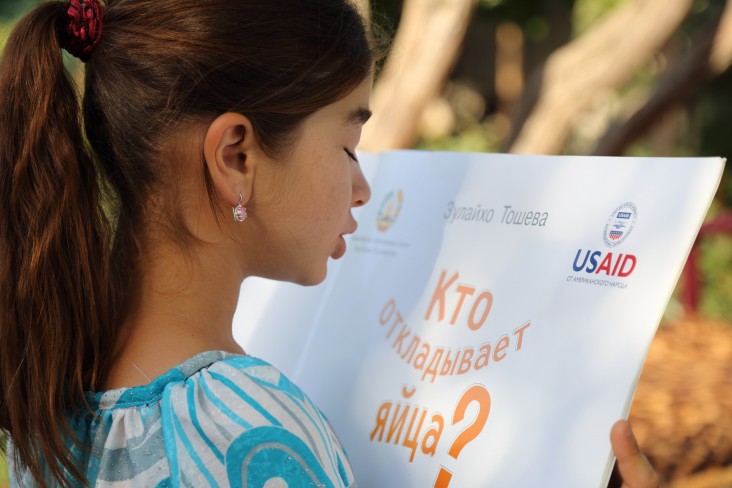Speeches Shim

Manija Sharipova is 11 years old and has just finished the 3rd grade at School #5 in Bokhtar. Manija was born with a visual impairment that makes it difficult to read a standard size text.
“When my friends shared stories from the books they read, I wanted to read too. But when I tried to read, my eyes hurt,” says Manija.
Due to her visual impairment, Manija did not learn to read or go to school until three years ago. Her grandmother, Sharifamoh, was approached by Roziya, a teacher from School #5, who informed her that the school had opened a class for students with visual impairment. On that same day, Sharifamoh took Manija to the school and registered her for the class.
“The first days of school were very difficult for Manija. She did not know the letters or their sounds. I advised her to persist, and to learn to read to be educated like her peers. I told her that education would open another world for her,” recalls Sharifamoh.
Roziya, the same teacher who informed Sharifamoh about the class for Manija, became Manija’s teacher at School #5. Roziya understood Manija’s struggle to read, as Roziya herself has a visual impairment.
“I always dreamed of becoming a teacher. As I have a visual problem, it was not easy for me to find an opportunity to teach at school. The day I received my order to teach was the best day of my life,” recalls Roziya.
Roziya participated in USAID Read with Me project trainings in 2019 which provided her with new tools and modern methodologies for reading instruction. “During the USAID trainings, I learned how to use different teaching methods, like incorporating games and strategies to engage students in reading,” says Roziya.
Roziya is also grateful to receive USAID-developed children’s books in Braille to use in her class. Before, teachers relied on textbooks printed in Braille, as children’s literature had not been printed in Braille in Tajikistan since 1991. USAID distributed 600 Braille books to specialized schools and classes in 2020.
“Thanks to USAID, we have access to Braille books, so Manija and the other children have more opportunities to read,” says Roziya.
After three years in Roziya’s class, Manija is reading and memorizing poems. Her favorite subjects in school are Tajik and Russian languages, and she also loves drawing.
“In addition to my textbooks, I have read about 10 fairy tales in Braille. And now I can share my favorite stories with my friends too. I would like to have many more Braille books because I can read them much more easily,” says Manija.
Like many other children, before the COVID-19 pandemic and early school closure, Manija went to school, studied, and played with her friends. Now Manija continues her education at home with the support of Roziya and her family.
During the school closure, Roziya visits her students’ homes with the USAID-donated Braille books and books with large print to help her students continue learning to read.
Roziya not only taught Manija to read Braille – she also taught Sharifamoh and Manija’s mother, so they could support Manija with her studies at home.
"It was difficult for Manija to read ordinary books in Cyrillic. But Manija is very successful in reading the Braille books Roziya brings home for her. I also learned Braille so I could help my daughter,” says Manija's mother.
Manija believes that retelling the books she has read will strengthen her memory. When asked about her dreams for the future, she says, “I want to be educated and become a famous hairstylist.”
The USAID Read with Me project in Tajikistan is a five-year initiative that seeks to improve reading outcomes for students in grades one through four in 80% of schools across Tajikistan. USAID aims to increase the availability of age-appropriate reading materials; provide educators with reading-specific in-service training; increase government support for reading through capacity building; and increase innovations and partnerships supporting literacy outcomes. By September 2021, USAID Read with Me will have reached over 28,000 teachers and over 664,000 students across Tajikistan.

Comment
Make a general inquiry or suggest an improvement.